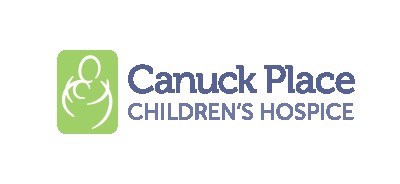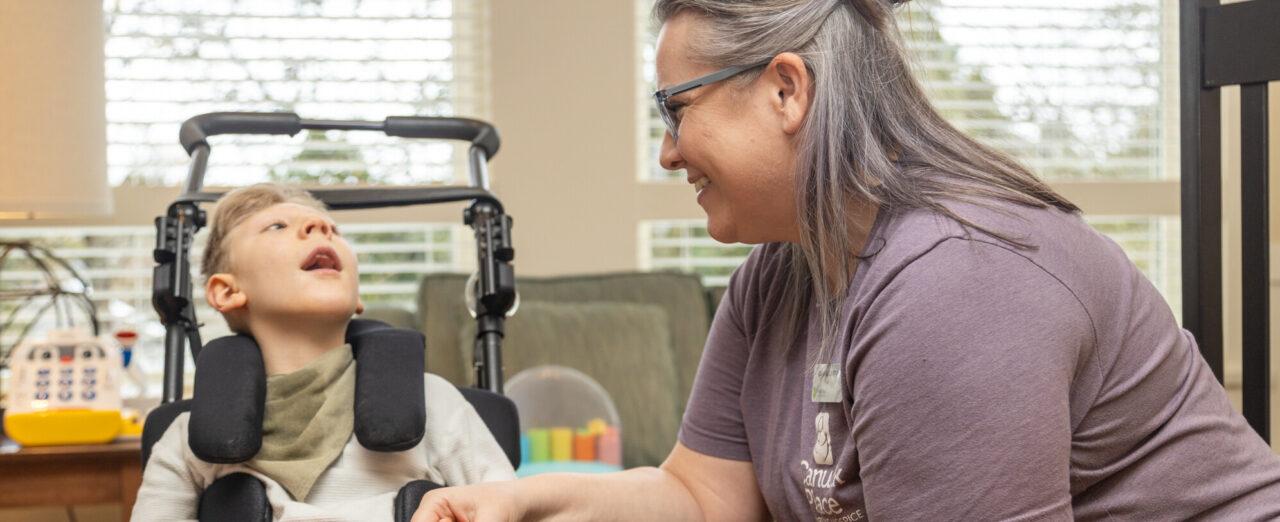 Canuck Place, where no moment is missed
Canuck Place, where no moment is missed
Pediatric palliative care in British Columbia and the Yukon
“Canuck Place is the best place to spend the worst days of your life,” says Sharon Bulger, Canuck Place Mom. “There is no one thing that can prepare a parent for hearing the words, ‘your child has cancer.’ A greater blow is learning that it is a rare, aggressive, inoperable type of brain cancer that has no cure.” Sharon and Glenn Bulger were introduced to Canuck Place two years into their son Cameron’s cancer journey, after he was diagnosed as terminal. Cameron was a nine-year-old boy who loved to laugh — particularly at his own jokes. He was faith-filled and wise beyond his years. Cameron loved his brother Zach and always wanted to build Lego, trade Pokemon cards, and ride bikes together. Canuck Place helped the Bulgers create a personalized family care plan that evolved as Cameron’s illness progressed and they chose to stay at home for Cameron’s end of life care. They also joined many recreation therapy outings. Cameron died at home on May 16 2020, surrounded by his loving family.
Necessity
Medical care for children with life-limiting conditions in British Columbia and the Yukon.
Activity
The nurses and physicians at Canuck Place provide pain and symptom management to some of the most medically complex children.
Countable effort
4 minutes of expert nurse care delivered in our hospices and in the community, meaning children receive the medication when they need it the most.
Result
Nurses alleviate pain and suffering while enhancing quality of life, using more than 150 medications and specialized equipment at no cost to families.
Systemic effect
The physical, psychological, and spiritual needs of both a child and their family are met, and families do not face this situation alone.
Background
We provide specialized and needed pediatric palliative care to children and families, the only pediatric palliative care provider for children aged 0-19 in BC and the Yukon. We see patients with a range new and rare illnesses, with further comorbidities requiring complex medical attention. Our goal is to optimize living for children and their families. On average, a child is in Canuck Place care for six years, and their family on the bereavement program for three years. For parents in particular, dealing with the complex health system can be a difficult and troubling task. Many seriously ill children have multiple medical providers, and receive treatment in more than one location which can be overwhelming. Tough decisions can range from practical issues—like whether to send a child to school during medical treatments—to more complicated ones like trying new medical options. By spending time getting to know the patient and family, the pediatric palliative care team can help them make decisions that are in line with their goals and values. Demand for our services continues to grow. Last year there were 871 families on our program, a 5% increase from the year prior; a 31% increase in community-based care, and a 61% increase in family members receiving overnight respite care. This means more children and families, particularly from rural and hard-to-reach communities, are accessing the care they need at no cost.
The good deed
The good deed will provide personalized, holistic care for children and families. We provide 24/7 hospice care and an extensive community program. Our staff are specialists in pediatric palliative care, available when and where care is needed. The majority of our operating budget goes to medical and nursing care. Our expert team takes pride in knowing we do all we can to alleviate pain and suffering. We offer medical respite care to give families a rest, temporarily caring for children with or without their parents. Our children receive pain and symptom management, recreation therapy, and counselling. They go to school, play music, and create art. Our program is designed to let families make the most of the time they have left. We also help families make difficult decisions around end-of-life care plans. Together we address the needs of pain management, emotional support, and spiritual care. We make this sacred transition as gentle as possible for the families we are honoured to serve.

About BC and Yukon Canada
Victoria (BC) & Whitehorse (Yukon)
Victoria's metropolitan area has a population of approximately 400,000 people and one of the highest population densities. Whitehorse is the largest city in northern Canada, with a population of around 30,000 people, making up nearly 75% of the Yukon's total population.
Victoria’s GDP per capita is likely close to or slightly below the provincial average for BC, which is around CAD 65,000. The Yukon has one of the highest GDP per capita rates in Canada due to its mining industry and resource development.
Victoria’s HDI would likely be very high, similar to the overall ranking of British Columbia (0.930), which has one of the highest HDI scores in Canada. Whitehorse would likely have a high HDI, possibly around 0.880 - 0.900, reflecting strong economic output, healthcare access, and education opportunities.
The population of BC increased by 7.6% from 2016 to 2021 and it is predicted to exceed three million residents in 2024. 13% of the population live in rural areas.
About the organization and further information

Canuck Place Children's Hospice
Website
Further information and source
- • Canuck Place Annual report.
- • Widger, K., Brennenstuhl, S., Tanuseputro, P., Nelson, K. E., Rapoport, A., Seow, H., ... & Gupta, S. (2023). Location of death among children with life-threatening conditions: a national population-based observational study using the Canadian Vital Statistics Database (2008–2014). Canadian Medical Association Open Access Journal, 11(2), E298-E304.
- • Census return for British Columbia. Available at: https://www12.statcan.gc.ca/census-recensement/index-eng.cfm (Accessed: April 2, 2024).




